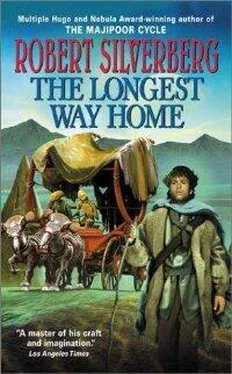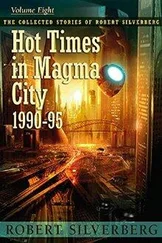He searched for a way to change the subject. But Thayle did the job for him.
“And where is it you come from?” she asked. “Ludbrek House, you said. Where is that?”
“Up in the north. On the other side of the mountains.”
“That far? You’ve come a very great distance, then. It’s hard to believe anyone could travel as far as that on foot. No wonder you suffered so much. —That’s a strange name for a town, Ludbrek House.”
“That’s not the town name. It’s the name of the Great House that ruled the district.”
“A Master-house?” Thayle said. “Is that what you mean?”
She spoke as though the system of Great Houses with satellite towns of Folk around them was nearly as unfamiliar to her as the deeds of Eysar were to him.
“A Master-house, yes,” he said. “We all belonged to Ludbrek House, many hundreds of us. But then the rebels burned it and I ran away. You don’t belong to any House here, then, is that right?”
“Of course not. You are among cuylings here. You mean you didn’t realize that?”
“Yes—yes, of course, I don’t know what I could have been thinking—”
Cuylings .
That word was new to him also. It must refer to free Folk, Folk who had managed to stay clear of the rule of the Masters, holding themselves somehow apart from the dominant economic structure of the world. Again Joseph saw how little he knew of these people, and what risks that posed for him. If he allowed this conversation to go on much longer she was bound to find out that he was an impostor. He needed to interrupt it.
He shook his head as though trying to clear it of cobwebs, and swayed, and gave a deliberate little lurch that sent him stumbling into her. As he came up against her he began to let himself fall, but she caught him easily—he was so light, so flimsy—and held him, her arm encircling his rib-cage, until he had found his footing again. “Sorry,” Joseph muttered. “Very dizzy, all of a sudden—”
“Maybe we should go inside,” she said.
“Yes. Yes. I guess I’m not strong enough yet to spend this much time on my feet.”
He leaned on her shamelessly as they returned to the house. She would be more likely to overlook his little lapses of knowledge if she could ascribe them to his general state of debilitation and exhaustion. He clambered gladly into his bed. When she asked him if he wanted anything to eat, Joseph told her that he did, and she brought him some of last night’s stew, which he ate with steadily increasing enthusiasm. Then he told her that he wanted to sleep for a while, and she went away.
But he was wide awake. He lay there thinking over their conversation—Eysar, cuylings, the Crossing—and remembering, also, the interesting sensations that the pressure of Thayle’s breast against his side had evoked in him. He enjoyed her company. And she seemed eager to make herself responsible for his welfare. Joseph saw that it would be only too easy to give himself away, though. There were only great gulfs of ignorance in his mind where the most elementary facts of Folkish life and history ought to be.
Stappin, the town governor, came to Joseph late that afternoon. Joseph was still in bed, sitting up staring idly at nothing at all, wishing he dared to take one of his books from his pack and read it, when the intense little man with the astonishingly broad shoulders and the bullet-shaped head entered his room. Joseph was instantly ill at ease. If he had come so close to revealing the truth about himself to Thayle in the course of the most casual sort of conversation, what chance did he have of concealing it from this hard-eyed, ruthless-looking man, who plainly had come here for the purpose of interrogating him? And what would happen to him, he wondered, once Stappin discovered his secret?
The governor had been doing a little research, too. He wasted no time on pleasantries. And he let it be known right away that he had his suspicions about Joseph’s story. “Ludbrek House, that is where you came from, is what you told us yesterday. How can that be? There are people here who have heard of that place. They tell me that Ludbrek House is such a very great distance from here. Beyond the mountains, it is.”
“Yes,” Joseph said impassively. He met the stony little eyes with an even stare. I am Joseph Master Keilloran, he told himself, and this man, formidable as he is, is only the governor of a Folkish town. With a little care he would get through this. “On the other side, in High Manza.”
With a little care, yes.
But he had let the words “High Manza” slip out without thinking. He regretted that at once. Did the Folk, he wondered, really use that term for the northern third of the continent, or was that in fact purely a Master designation?
With his very first statement he had quite possibly placed himself in peril. He saw that he must be more sparing in his replies. The less he said, the less likely was it that he would stumble into some blunder that would disclose the truth about himself. It had been a mistake to remind himself a moment ago that he was Joseph Master Keilloran: right now he was Waerna of Ludbrek House, and he must be Waerna down to his fingertips.
But Stappin did not seem to be bothered by the phrase itself, only by the improbability of the journey. All he said was, “That is many hundreds of miles. It was winter. It rains up there in the winter, and sometimes there is snow, also. There is little to eat. No one could survive such a journey.”
Joseph indicated his emaciated form, his wild tangled beard. “You can see that I very nearly did not.”
“No. You could not have survived, not on your own. Someone must have helped you. Who was that?”
“Why, it was the Indigenes,” Joseph said. “I thought you knew that!”
Stappin appeared genuinely startled. “They would not have done that. The Indigenes are concerned only with the Indigenes. They will have nothing to do with anyone else.”
“But they did,” Joseph said. “They did! Look, look there—” He indicated the ragged Indigene robes that he had been wearing when he arrived in Eysar Haven. Saban or Thayle had washed them and stacked them, neatly folded, in a corner of the room. “That cloth—it is Indigene weave. Look at it, Governor Stappin! Touch it! Can it be anything other but Indigene weave? And that fur mantle next to it. They gave it to me. They took me in, they fed me, they moved me from village to village.”
Stappin spent some time digesting that. It was impossible to tell what was going on behind those cold, hard eyes.
Then, unexpectedly, he said, “Why is it you speak so strangely?”
Joseph compelled himself to meet the governor’s gaze steadily, unflinchingly. “What do you find strange about my speech, Governor Stappin?”
“It is not like ours. Your tone of voice. The way you put your words together.”
Calm, he thought. Stay calm. “I am of Ludbrek House in High Manza, and this is the way we speak there. Perhaps a little of the Masters’ way of speaking has come into our speech and changed it. I could not say.”
“Yes. Yes. I forget: you are stendlings, there.”
Another new word. From the context Joseph guessed it was the antithesis of “cuyling,” and meant—what? Serf? Slave? Vassal? Something on that order.
He simply shrugged. He was not going to get into a discussion of a word whose meaning was uncertain to him.
“And how came it to pass,” Stappin said, and there was still an ugly little suspicious edge to his voice, “that you and the Indigenes became such great friends?”
“The uprising happened,” Joseph said. “That was the first thing.”
He studied Stappin carefully. By now Joseph had concluded that these cuyling Folk of Eysar Haven not only had taken no part in the rebellion, but that they must know very little about it. Stappin did not question his use of the term. He did not react to it in any way. He remained standing as he was, motionless beside Joseph’s bed, legs far apart, hands balled into fists and pressing against his hips, waiting.
Читать дальше












